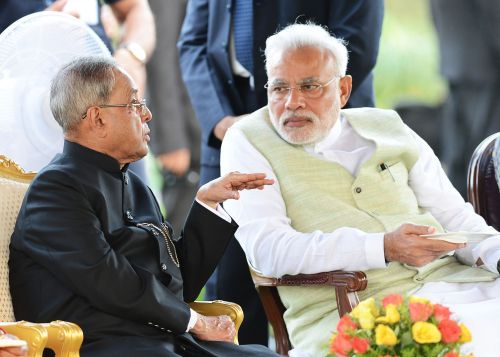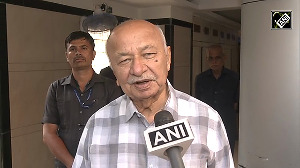The win in UP is especially significant because UP assembly members carry the maximum value of votes in a Presidential election, given the fact that the state is India's most populous.
Sangita Bakaya reports from Lucknow.
 The BJP's decisive victory in the Uttar Pradesh and Uttarkhand assembly polls will empower the party in the selection of the next presidential candidate when President Pranab Mukherjee retires in July.
The BJP's decisive victory in the Uttar Pradesh and Uttarkhand assembly polls will empower the party in the selection of the next presidential candidate when President Pranab Mukherjee retires in July.
The BJP, which has a thumping majority in the Lok Sabha, with 281 MPs in the House of 543, needed extra numbers to have a candidate of its choice when the incumbent demits office on July 25, 2017.
Mukherjee's successor will be elected by an electoral college comprising members of both Houses of Parliament and elected members of the assemblies of 29 states plus the national capital territory of Delhi and the Union Territory of Puducherry.
The BJP is already in power in Maharashtra, Gujarat, Haryana, Chhattisgarh, Jharkhand, Madhya Pradesh and Assam and in coalition with the People's Democratic Party in Jammu and Kashmir and with the Telugu Desam Party in Andhra Pradesh.
Now with Uttar Pradesh and Uttarakhand in its kitty with a huge majority, the BJP is now in a better position to see its candidate through to the office of President.
Having a person of its choice in Rashtrapati Bhavan will be helpful to the party if it needs support in complicated political situations besides getting formal assent to laws passed by Parliament.
The win in UP is especially significant because UP assembly members carry the maximum value of votes in a Presidential election, given the fact that the state is India's most populous.
The value of a vote of an elected state legislator is equivalent to the population of the state divided by the number of elected legislators divided -- yet again -- by 1,000.
Also falling vacant in August is the vice-president's office with incumbent Mohammed Hamid Ansari completing his second five-year term.
While the BJP will be certain to nominate one of its candidates for the President's post, the post of vice-president could go to an ally.
The BJP in 2002 got its nominee -- former Rajasthan chief minister Bhairon Singh Shekhawat elected as vice-president.
The notification for the Presidential election could be issued sometime in June.
The electoral college which elects the President through the system of proportional representation comprises of elected MPs and members of state legislative assemblies -- a total of 4,896 voters including 4,120 MLAs and 776 elected MPs.
While the Lok Sabha Speaker, an elected member, can vote, two nominated members from the Anglo-Indian community in the Lok Sabha and 12 nominated MPs in the Rajya Sabha cannot.
The value of an MLA's vote depends on the size of the state s/he represents. But the value of the vote of a MP is the same and does not vary.
The total value of the electoral college is 10,98,882.
Before the assembly polls, the NDA was short of 75,076 votes in terms of value. But after the BJP's astounding performance in UP, Uttarakhand and Manipur, the gap will narrow down to 20,000 votes, an official in the Election Commission explained.
If it is able to get the support of parties like the AIADMK with 134 MLAs and the BJD with 117 MLAs, it can place the person of its choice in the Rashtrapati Bhavan easily.
In the 243-member Rajya Sabha, the BJP as of now has 56 members, while the Congress with 59 is the single largest party.
With Saturday's win, the BJP is set to emerge as the single largest party in the Rajya Sabha too next year and the NDA's tally would be close to 100.
It would, however, still be short of a majority in the Upper House.
The BJP hopes that the good show in the elections will also help it on the Goods and Services Tax Bill.
The GST, considered to be country's biggest reform measure in two decades has been pending since 2015 because for lack of cooperation from the Congress in the Upper House of Parliament where the BJP is short in numbers.
For passage of the bill in the Rajya Sabha, there is a need for the number of MPs opposing it comes down.
Now, with the massive majority in UP and Uttarakhand, the BJP hopes to send the maximum number of its candidates to the Rajya Sabha during the biennial elections to the Upper House.
The changed scenario will pave way for more BJP MPs in the Rajya Sabha by the end of July with upcoming retirements.
IMAGE: President Pranab Mukherjee with Prime Minister Narendra Modi.











 © 2025
© 2025